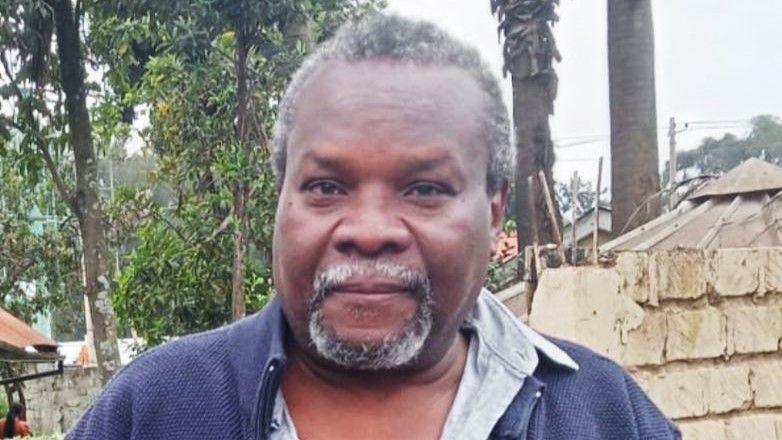Kenyan journalist freed after 'mistaken' arrest drama

Veteran Kenyan journalist Macharia Gaitho does not accept it was a case of mistaken identity
- Published
Kenyan police have freed a veteran journalist after “mistakenly” arresting him at a police station and dramatically pushing him into a private vehicle.
Macharia Gaitho, 65, said he was trailed near his home in the capital, Nairobi, by people in two cars, who refused to identify themselves.
He was with his 19-year-old son, who drove with him to a nearby police station for his safety – where he was violently shoved into a car and driven away.
Police later said it was a case of “mistaken identity” and that they had been hunting another person who they accuse of discrediting police investigations into a suspected serial killer.
“The [police] would like to clarify to the public that this morning, we arrested journalist Macharia Gaitho in a case of mistaken identity, meant for the arrest of Francis Gaitho who is our subject of investigation,” they said in a statement.
The two are not related.
A video shared widely on social media shows the journalist being roughed up and forced into a white car by uniformed officers and others in civilian clothes.
It triggered a furious response from Kenyans online, following a wave of accusations that security officers had illegally abducted people seen to be linked to recent anti-government protests.
Last week, Kenya's police chief resigned following the criticism.
Mr Gaitho told journalists that in the car, he was “sandwiched between two men in civilian clothes”.
“I was handcuffed and assaulted,” he said.
He said the men had demanded to know why he was resisting arrest.
"I told them I was not resisting arrest, I was resisting criminals," he said, noting that they had not identified themselves.
They later stopped and after some phone calls, drove him back to the Karen police station where he had been arrested.
The veteran journalist has disputed the police statement, saying “it is me they were looking for”, noting there was a big difference between him and the other Mr Gaitho.
"I am twice his age. He does not live where I live because they trailed me from my home. He does not drive the same car as me."
He said he believes the “attempted abduction” was related to his work as a journalist.
In their statement, the police said the incident was "highly regrettable” and insisted that “we do not target journalists in any way”.
The veteran journalist is a long-running columnist with Kenya’s biggest newspaper, the Daily Nation, and often writes hard-hitting articles that criticise the government.
He has said he is going to sue the police over the incident, which comes just a day after a reporter was badly injured after being shot while covering anti-government protests on Tuesday.
The Kenya Union of Journalists termed it a "targeted attack" by a "rogue police officer".
On Wednesday, Mr Gaitho said he would not be "cowed" by the attempts to intimidate him.
"We were there during the struggle against the one-party dictatorship [of former President Daniel arap Moi]. If we resisted Moi, who are these ones?"
Meanwhile, Francis Gaitho, a social media influencer who describes himself as an aspiring politician, said he was consulting with his lawyers on how to proceed.
He said he would present himself to the police.
The police on Monday accused him of posting a name, image and other details of another man as the suspect behind the gruesome murder of at least nine women whose dismembered bodies have recently been retrieved from a disused quarry used as a dumpsite in Nairobi.
The police said the "shaken young man", whose details had allegedly been shared by Francis Gaitho, had surrendered himself to the authorities to try and clear his name.
On Monday, the police named Collins Jumaisi Khalusha, 33, as the alleged "serial killer" suspect behind the gruesome deaths.
They said he had confessed to killing 42 women, but Mr Khalusha's lawyer has since said he was tortured into making a confession.
Kenyan police have often been accused of brutality, bribery and unlawful killings and not doing enough to resolve previous crimes, including that of Rita Waeni, whose shocking killing ignited a wave of anti-femicide protests earlier in the year.
Since the protests in Kenya began a month ago, a number of activists have recounted being taken from their homes or other places by hooded, armed men and others say they are living in fear.
A state-funded rights group says that so far at least 59 people have been abducted or are missing.
Kenyan police recently deployed hundreds of its officers to help combat raging gang violence in Haiti, which some have questioned, given the criticisms levelled against them.
You may also be interested in:

Go to BBCAfrica.com, external for more news from the African continent.
Follow us on Twitter @BBCAfrica, external, on Facebook at BBC Africa, external or on Instagram at bbcafrica, external